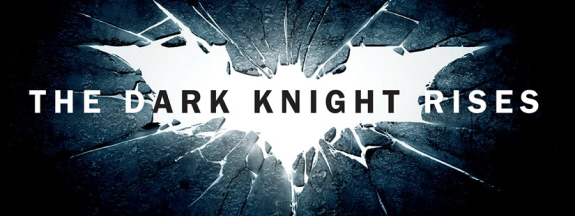
For your convenience, I’ve included two breaks to alert you where spoilers begin and end. Spoiler text will be in grey. Please be good to yourself and avoid spoilers if you so desire.
Christopher Nolan’s conclusion to his Batman trilogy offers moving character work, thrilling action, breathtaking imagery and an emotionally resonant end to one of cinema’s most successful franchises. By no means a failure, the film introduces several ideas only to abandon them in the big finish. Spotty and uneven in parts, Nolan has deviated from the greater Bat mythos to give these films a definitive ending. That notion will turn off many purists, but I went home very pleased with what he’s accomplished.
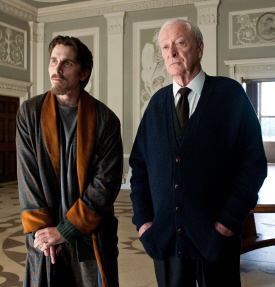 Detective Comics #27: Bob Kane and Bill Finger first unfurled Batman to the world in 1939. In the 73 years since, the fictional character has been a fixture in the popular consciousness like few others. This man, with all his eccentricities, becomes vengeance in a batsuit. Extolling brutality night after night on criminals like the one who murdered his parents, Bruce Wayne exists for the sole reason of being this restless and willful crusader.
Detective Comics #27: Bob Kane and Bill Finger first unfurled Batman to the world in 1939. In the 73 years since, the fictional character has been a fixture in the popular consciousness like few others. This man, with all his eccentricities, becomes vengeance in a batsuit. Extolling brutality night after night on criminals like the one who murdered his parents, Bruce Wayne exists for the sole reason of being this restless and willful crusader.
That’s my idea of Batman, it’s not Chris Nolan’s – and this is where I suspect some will take issue with The Dark Knight Rises. His is a Batman who walked away – for eight years. Something that differs from most comic book interpretations is that Nolan’s Bruce Wayne has an endgame. He doesn’t want to be Batman forever (sorry, Mr. Schumacher). And while it’s inconsistent with the Batman many love, I credit Chris and co-writer Jonathan Nolan for including some degree of character progression. Bruce Wayne is no longer stirred by his parents’ deaths the way he was in Batman Begins. Denigrated and broken from his (brief) time as Batman, we meet him as a recluse – holing up in a rebuilt Wayne Manor after the events of The Dark Knight.
And it makes sense considering Nolan’s insistence on grounding these films in some semblance of reality, though this is certainly the most outlandish entry in the series. Bruce isn’t a spring chicken anymore. Jumping off rooftops takes a toll – his knees are fused, he has brain damage, he’s punchy, he’s Rocky Balboa. And that’s the funny thing, because of all the films Rises could emulate, its narrative bears the most striking resemblance to Rocky 3. Rocky and Wayne are both shells of their former selves, and it’s not until Bane / Clubber Lang roll into town and knock them silly that the motivation starts creeping back in. For Rocky, it takes a brutal beating from Clubber and the death of Mickey. For Batman, something worse.
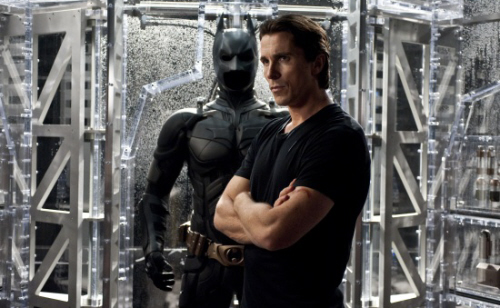
The Rocky comparison feels apt for more than the above-stated reasons. I don’t want to say there’s a training montage set to the tune of Hearts on Fire, but Rises goes to a familiar place where a fallen hero tries not only retain his former glory, but exceed it.
Of greater significance is how the film fits into this franchise. There’s great contrast in both the tone and look of Batman Begins and The Dark Knight. Of the two, Rises most resembles The Dark Knight. Part of me wishes Nolan and Warner Brothers would have picked one city and filmed all three movies there. It’s a gripe made more minor by the fact that each film has its own personality on account of the disparity. The streets of Pittsburgh serve amicably as Gotham.
Also setting Rises apart is Nolan and cinematographer Willy Pfister’s decision to shoot mostly in daylight. They shot a beautiful film, made all the more appealing by filming so much of it in 70mm. There are sweeping cityscape shots and action sequences that are utterly breathtaking. It’s admittedly jarring to see this Batman running through the streets completely exposed and without the darkness that he once used as a weapon. But it’s also justified by Tom Hardy’s Bane. This isn’t a character made to be afraid. Batman learns very quickly that his old tricks will not work on Bane.
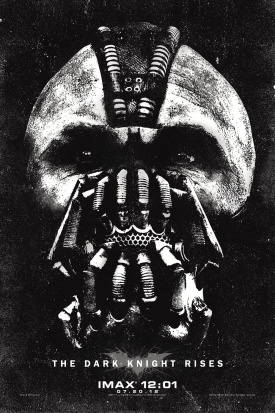 No actor was ever going to have it harder here than Tom Hardy. Bane is the direction Batman could have gone had he fulfilled his destiny with the League of Shadows – with motivations as disturbing and finite as Ra’s al Ghul. Hardy’s also the front-and-center villain following up one of the greatest performances of all time in Heath Ledger’s Joker. Hardy disappears inside his beast (one completely divorced from the comic character on which he’s based). And he’s a physical and joyless-enough presence to avoid comparison Ledger’s dainty, deranged clown prince. I liken Hardy’s performance to David Prowse and James Earl Jones collaborating to construct Darth Vader. Here, Hardy fills these dual roles admirably – being both the physically menacing monster as well as the voice (one that was clearly redone in post).
No actor was ever going to have it harder here than Tom Hardy. Bane is the direction Batman could have gone had he fulfilled his destiny with the League of Shadows – with motivations as disturbing and finite as Ra’s al Ghul. Hardy’s also the front-and-center villain following up one of the greatest performances of all time in Heath Ledger’s Joker. Hardy disappears inside his beast (one completely divorced from the comic character on which he’s based). And he’s a physical and joyless-enough presence to avoid comparison Ledger’s dainty, deranged clown prince. I liken Hardy’s performance to David Prowse and James Earl Jones collaborating to construct Darth Vader. Here, Hardy fills these dual roles admirably – being both the physically menacing monster as well as the voice (one that was clearly redone in post).
I don’t know that any actress can replace Michelle Pfeiffer as my definitive Catwoman, but Anne Hathaway does some of the best work of her career here. The skintight suit, the goggles that double as cat ears, those razor sharp stilettos – it all contributes to a believable Nolanverse Catwoman. But it’s Hathaway morally ambiguous turn that makes the character a success. Christian Bale is dialed in with Hathaway in their scenes together in a way that clues the audience into how vulnerable and wounded these two souls really are.
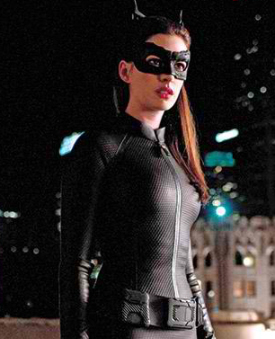 This is easily Bale’s best performance of the series. Moreso than The Dark Knight, this is very much Batman’s story again. It’s Wayne’s journey to fulfilling his destiny and finally being the hero Gotham deserves and needs that drive the force of the narrative. And truthfully, Bale has more to do this time out. There’s a much more rounded arc than the character’s was allowed in the previous film – Bale knocks it out. Those discouraged by Batman’s voice will still find issue here, but it’s an improvement over Knight.
This is easily Bale’s best performance of the series. Moreso than The Dark Knight, this is very much Batman’s story again. It’s Wayne’s journey to fulfilling his destiny and finally being the hero Gotham deserves and needs that drive the force of the narrative. And truthfully, Bale has more to do this time out. There’s a much more rounded arc than the character’s was allowed in the previous film – Bale knocks it out. Those discouraged by Batman’s voice will still find issue here, but it’s an improvement over Knight.
Michael Caine’s Alfred would be award worthy if he was in the film more, and Morgan Freeman’s Lucius Fox is essentially the same as always. Unfortunately there are two characters, as well as some greater issues with the film, that I can’t discuss without going into heavy…
Spoilers
Marion Cotillard’s Miranda Tate, a Wayne Enterprises board member and major proponent for the corporation’s clean energy project, is a large part of Rises‘ issues. Both the character, her motivations, and everything they entail serve as a drag on this latest episode. I don’t think it’s a surprise that she’s revealed to be Talia, daughter of Ra’s al Ghul and heir apparent to a rejuvenated League of Shadows. Neither Cotillard’s performance nor Talia’s inclusion, aside from a very sweet flashback reveal, serve the film well.
Tate wants to get her hands on Wayne Enterprises clean energy source they’re keeping a lid on beneath the city. And this is where it gets ludicrous: this source can easily be rejiggered into an atomic bomb that can wipe out the city (leading to the film’s worst line, paraphrasing: “This device is now an atomic bomb.”) – giving Gotham its threat. Why would Wayne keep something so dangerous under the city he’s trying to protect? And worse, how could the World’s Greatest Detective be so easily swindled by the daughter of his arch nemesis?
Cotillard makes a better Tate than she does a Talia, but everything about the turn is so telegraphed. Worse, Talia’s presence at the very end lessens Bane – making his showdown with Batman secondary to a chase scene that doesn’t begin to compare to Nolan’s brilliant “Lower Wacker” sequence in The Dark Knight. Talia’s inclusion was meant to bring the trilogy full circle, but Bane is already revealed to be League of Shadows at this point. It serves only to make Batman look bad at his job, that Talia’s able to infiltrate Wayne’s life the way she does.
Equally problematic and unnecessary is Joseph Gordon Levitt’s John Blake. Levitt’s performance is inoffensive, but Blake is altogether unbelievable. Like Wayne, he’s an orphan. And he easily deduces Wayne’s alter-ego, quickly allowing him into Batman’s inner circle. One of the film’s main cruxes is the idea of a Batman, that anyone can be him. Blake is certainly game for the part, if under qualified. Oh, and he’s Robin.
I’m surprised Nolan did it. Blake never suits up, and he’s only revealed as Robin in a cute aside, but the implication is there. Even after the reveal, it’s implied that Blake will assume the mantle of the Batman in Wayne’s “absence.” Still, after nine hours and all the punishment Wayne takes in this film, it becomes clear that only Bruce Wayne can be Batman. It’s a contradiction we encounter throughout the film, that Batman the idea is more important than Batman the man. And then Wayne does something that only someone with his immense resources and talents could pull off.
End Spoilers
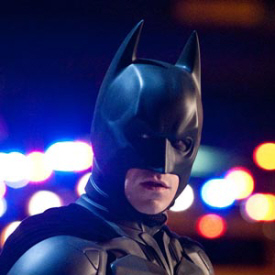 Removed of these weaker aspects, The Dark Knight Rises is still almost a masterpiece. Nolan introduces the idea of class warfare only to back down in the film’s final act – abandoning weightier ideas for widescale blockbuster territory. The Dark Knight Rises is an incomplete film in this regard. Nolan creates a stripped down “No Man’s Land”-style Gotham where society is torn asunder. The first and second acts are very much a dissection of class and wealth, but it all goes nowhere. The filmmakers introduce an intriguing conceit only to leave it glaringly unrealized.
Removed of these weaker aspects, The Dark Knight Rises is still almost a masterpiece. Nolan introduces the idea of class warfare only to back down in the film’s final act – abandoning weightier ideas for widescale blockbuster territory. The Dark Knight Rises is an incomplete film in this regard. Nolan creates a stripped down “No Man’s Land”-style Gotham where society is torn asunder. The first and second acts are very much a dissection of class and wealth, but it all goes nowhere. The filmmakers introduce an intriguing conceit only to leave it glaringly unrealized.
And yet, despite these issues, I’d still place The Dark Knight Rises among my favorite films of the summer. After two films, Nolan is able to draw back and pay off character moments that feel wholly gut wrenching. One exchange in particular, between two characters that have been here from the beginning, is one of the most satisfying moments I’ve had with these people in any medium. Fans of Begins in particular, can look forward to the closure of a few hanging threads.
And that’s the strongest feeling I take away from The Dark Knight Rises: closure. Comics don’t end; there will always be a Batman. Similarly, there will always be a Batman on film. But Nolan uses his conclusion to give the Batman an ending that, while not necessarily true to my concept of Batman, is true to his. And I absolutely respect that. This trilogy, these characters, this Gotham, it all belongs to Christopher Nolan after three films. It might be Mr. Nolan’s world, but I’m glad to have had the opportunity to visit.
Rating: 




Out of a Possible 5 Stars